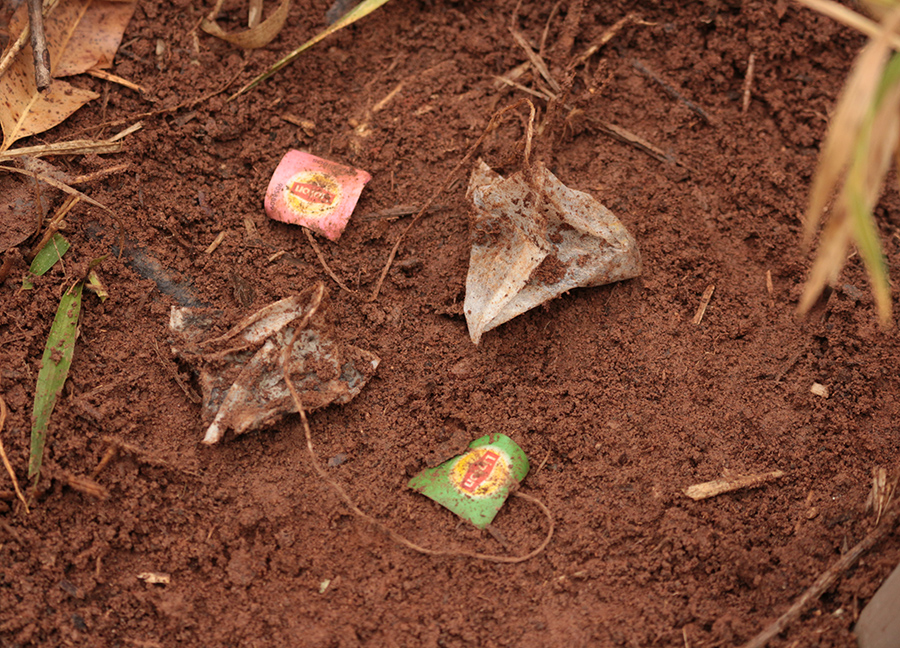Scientists use teabags to assess soil quality
Scientists use teabags to assess soil quality
Photo: Luiz Paiva

The Dutch methodology called Tea Bag Index (TBI) is being used by scientists from Embrapa Southeastern Livestock in partnership with the Federal University of São Carlos (UFSCar)
|
Researchers are burying teabags to assess the quality of the soils in production systems. This is a Dutch methodology called Tea Bag Index (TBI), and it is being used by scientists from Embrapa Southeastern Livestock in partnership with the Federal University of São Carlos (UFSCar) Department of Environmental Sciences.
The technique allows one to follow the rate at which the organic matter contained in each bag is decomposed and compare this index with different production systems. “In general, the more the soil decomposes organic matter, the more quality it has. It is a sign that the microbial community is working”, explains the UFSCar professor Marcel Tanaka.
He reports that he has been applying the method in forest rehabilitation areas (plant recovery). His team buries tea bags in riparian forests to observe recovery in such areas and subsequent return of the environmental services provided by the vegetation. Such services incluse the conservation of water bodies - the trees retain sediments and prevent them from reaching lakes, streams, rivers and others -, and increases in water infiltration into the soil - without trees, water evaporation is higher. Moreover, rehabilitated forests increase carbon sequestration in the atmosphere and nutrient cycling.
From native vegetation to agriculture and livestock
The method had been restricted to those recovery areas until the Embrapa researcher Alberto Bernardi (photo on the right) started to apply it in production systems in 2019. The experiment used about 400 teabags that were buried at a depth of eight centimeters in areas with integrated systems, i.e. where there are cattle, plantations and forests (generally of eucalyptus) simultaneously, which is called ICLFS (integrated crop-livestock-forestry systems). The tea was placed in the rows and space between the lines of eucalyptus.
After three months, the teabags were removed for analysis. The material was processed at UFSCar in an equipment called muffle, a type of greenhouse or furnace with high temperatures that is used in laboratories. Since the bags contained dirt, fungus and other microorganisms, the samples needed to "burn" at 500º Celsius. “That leaves ashes and inorganic material”, Tanaka explains.
At Embrapa's experimental field in São Carlos, the TBI was applied in areas under the shade of trees from the integrated system and in pastures under the full sun, with no shade. In order to prevent the teabags from being lost with time, a brown PVC tube was placed in every point of the soil to be studied. During the experiment, there had to be maintenance for some of such points because of the presence of animals. “It is the first time that the technology is being used in the presence of cattle”, the professor from UFSCar reveals.
This study is part of environmental manager Débora Bessi's (pictured on the left) PhD thesis, which is due to be concluded in 2021. She is going to complete the study with data from the chemical and physical soil analyses made by the Embrapa laboratory. “It is important to know these properties because they will condition decomposition processes. The figures will allow us to learn about what happens”, Bernardi states. Embrapa also supplied meteorological data about that area.
“We started from the assumption that ICLF systems change the soil. The expectation is that they increase decomposition and organic activities, and that the soil starts to retain more carbon,” estimates the researcher from Embrapa. Hence ICLFS would contribute to balance greenhouse gas emissions from cattle farming.
Not any teaThe tea used in the experiments is standardized and not available in Brazil. For the 20 boxes acquired, the project paid about 90 euros. The Tea Bag Index methodology has been applied in a global experiment and all the countries involved are using the same product. The idea is to learn about soil decomposition processes in different regions of the planet in order to propose solutions and technologies that reduce the impacts of the climate change. On the website Teatime4Science there is more information about this world research. “Teabags can provide vital information about the global carbon cycle. And consumers worldwide can improve climate modelling without much effort or equipment”, reports the introduction to the project. Marcel Tanaka (photo) explained that, before this methodology, there had already been experiments that placed organic raw material (generally leaves) inside small nylon bags. Those bags were buried and later recovered for analysis. “The problem is that the organic matter from one given region can be very be different from other regions. Thus there would not be a way to standardize a global study”, the professor details. When Bessi's thesis is published, the results of the experiment will be submitted to the global project and Brazil will start to integrate the group of countries that has adopted “sowing tea” for research purposes. This Embrapa study is funded by the ICLFS Network, an association that gathers public and private institutions with the aim of accelerating the adoption of integrated crop-livestocck-forest technologies by farmers as part of an effort to sustainably intensify Brazilian agriculture. |
Translation: Mariana Medeiros.
Ana Maio (MTb 21.928)
Embrapa Southeastern Livestock
Press inquiries
pecuária-sudeste.imprensa@embrapa.br
Phone number: +55 16 3411-5734
Further information on the topic
Citizen Attention Service (SAC)
www.embrapa.br/contact-us/sac/
